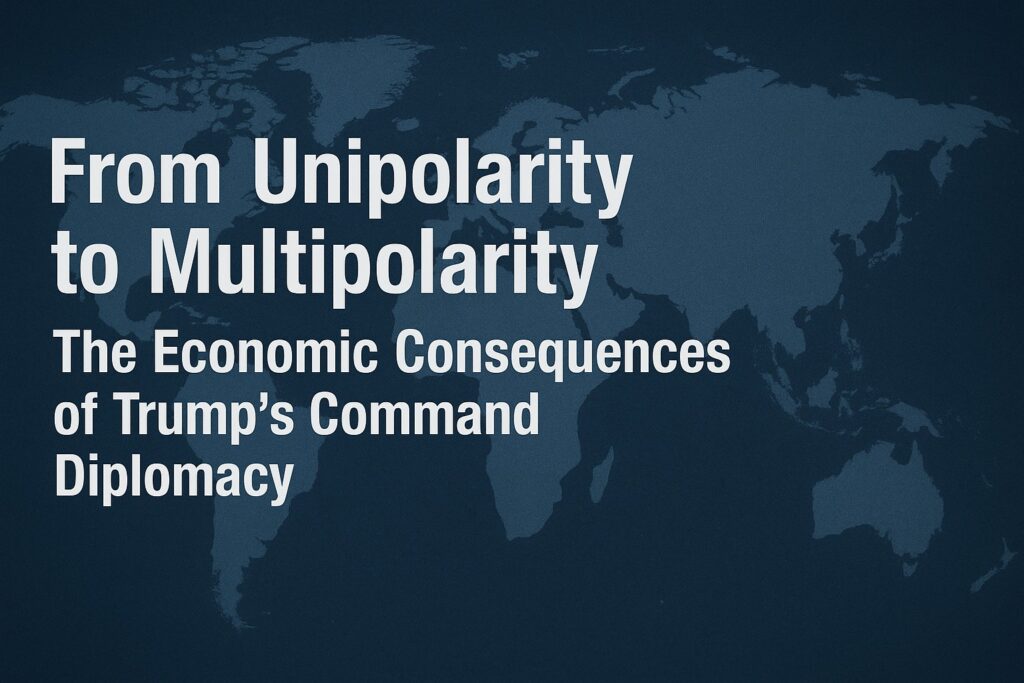Since the start of his second term, Donald Trump has approached international relations not through mutual interests but by emphasizing command and obedience and views America as an unmatched superpower with an unpredictable policy that emphasizes strength rather than cooperation with allies. One of the clearest signs of Trump’s new approach to global leadership is his trade and tariff policies, which have marked a significant departure from the traditional American approach to global leadership, which, despite its shortcomings, relied on forming alliances and promoting stability through shared economic and political objectives.
A wide range of imports has been subjected to customs tariffs by his administration, a practice that he claims is intended to protect American workers. However, these measures had a significant global impact. The escalation of tariffs has caused widespread uncertainty in international markets, disrupted supply chains, and eroded investor confidence. Even longstanding allies, such as Canada and European Union member states, have found themselves the targets of protectionist measures that undermine decades of carefully negotiated trade relationships.
Canada, in particular, has borne the brunt of Trump’s unpredictable economic strategy. As one of the United States’ closest neighbors and largest trading partners, Canada’s economic stability is deeply connected to that of its southern neighbors. Tariff disputes over steel, aluminum, and other key industries strained bilateral relations and forced Canadian policymakers to rethink their economic dependencies. What was once a predictable and mutually beneficial partnership has been overshadowed by political tensions and economic uncertainty. Canada and other allies have begun to question America’s reliability as a stable economic partner as a result of Trump’s unilateral decisions, often without consultation with allies.
Trump’s approach has impacted the traditional Western alliance system established after World War II. His “America First” rhetoric implied that alliances hold value only when they align with immediate American interests. This limited perspective on cooperation undermines the principles of collective security and shared prosperity that have historically characterized U.S. leadership. For nations such as Canada and those in Europe, which prioritize predictability and a rules-based international order, Trump’s strategy poses both strategic and ethical challenges. Canada and Europe face the challenge of balancing their longstanding relationships with the United States with evolving global dynamics. Both regions value stability, transparency, and predictability in international relations—principles that clashed with the unpredictable decision-making of the Trump administration.
Consequently, many nations have embarked on diversifying their diplomatic and economic partnerships. For instance, Europe has fortified its economic connections with Asian markets, whereas Canada has actively pursued deeper engagement with Asia-Pacific economies. This realignment of global alliances has paved the way for other powers to expand their influence, with China taking a leading role in the process. Unlike strategies centered on dominance and compliance, China’s foreign economic policy is characterized by a focus on mutual benefit, investment, and pragmatic collaboration. Through major initiatives such as the Belt and Road Initiative, Beijing extends infrastructure financing and trade opportunities to both developing and advanced economies.
While China is clearly advancing its own agenda, it presents its strategy as one of collaboration and long-term benefits, avoiding the use of threats or ultimatums. In contrast, the United States, once a leading force in globalization and multilateralism, now appears unpredictable and swayed by short-term objectives and internal political dynamics. This inconsistency in leadership creates an opportunity for other entities, such as China, the European Union, and regional groups such as ASEAN, to establish new standards of cooperation. These efforts could reshape the future of global governance and contribute to the rise of a multipolar world order, which starkly contrasts with the U.S.’s focus on maintaining a unipolar stance, particularly in economic matters.
Fundamentally, Trump’s economic and diplomatic strategies, rooted in command rather than collaboration, hastened changes in global relations. By distancing allies and disrupting markets, these actions have unintentionally opened the door for new power centers, notably China, which operates on a global scale through pragmatic and commercial means. Although the consequences of this shift are still unclear and it is uncertain whether it will lead to a more balanced or fragmented world, it is evident that the period of unquestioned American supremacy is transitioning to a complex, multipolar environment where compliance is no longer the main currency in diplomacy.

